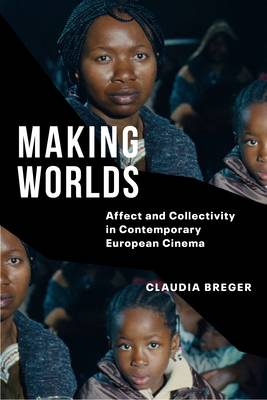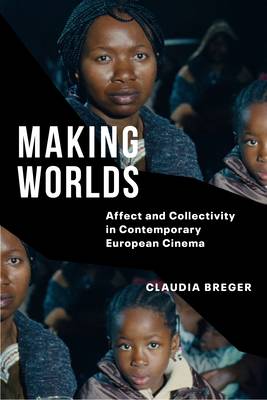
- Afhalen na 1 uur in een winkel met voorraad
- Gratis thuislevering in België vanaf € 30
- Ruim aanbod met 7 miljoen producten
- Afhalen na 1 uur in een winkel met voorraad
- Gratis thuislevering in België vanaf € 30
- Ruim aanbod met 7 miljoen producten
Zoeken
Making Worlds
Affect and Collectivity in Contemporary European Cinema
Claudia Breger
Paperback | Engels
€ 59,45
+ 118 punten
Uitvoering
Omschrijving
The twenty-first century has witnessed a resurgence of economic inequality, racial exclusion, and political hatred, causing questions of collective identity and belonging to assume new urgency. In Making Worlds, Claudia Breger argues that contemporary European cinema provides ways of thinking about and feeling collectivity that can challenge these political trends.
Breger offers nuanced readings of major contemporary films such as Michael Haneke's The White Ribbon, Alejandro González Iñárritu's Biutiful, Fatih Akın's The Edge of Heaven, Asghar Farhadi's A Separation, and Aki Kaurismäki's refugee trilogy, as well as works by Jean-Luc Godard and Rainer Werner Fassbinder. Through a new model of cinematic worldmaking, Breger examines the ways in which these works produce unexpected and destabilizing affects that invite viewers to imagine new connections among individuals or groups. These films and their depictions of refugees, immigrants, and communities do not simply counter dominant political imaginaries of hate and fear with calls for empathy or solidarity. Instead, they produce layered sensibilities that offer the potential for greater openness to others' present, past, and future claims. Drawing on the work of Latour, Deleuze, and Rancière, Breger engages questions of genre and realism along with the legacies of cinematic modernism. Offering a rich account of contemporary film, Making Worlds theorizes the cinematic creation of imaginative spaces in order to find new ways of responding to political hatred.Specificaties
Betrokkenen
- Auteur(s):
- Uitgeverij:
Inhoud
- Aantal bladzijden:
- 344
- Taal:
- Engels
Eigenschappen
- Productcode (EAN):
- 9780231194198
- Verschijningsdatum:
- 14/04/2020
- Uitvoering:
- Paperback
- Formaat:
- Trade paperback (VS)
- Afmetingen:
- 152 mm x 229 mm
- Gewicht:
- 453 g

Alleen bij Standaard Boekhandel
+ 118 punten op je klantenkaart van Standaard Boekhandel
Beoordelingen
We publiceren alleen reviews die voldoen aan de voorwaarden voor reviews. Bekijk onze voorwaarden voor reviews.











